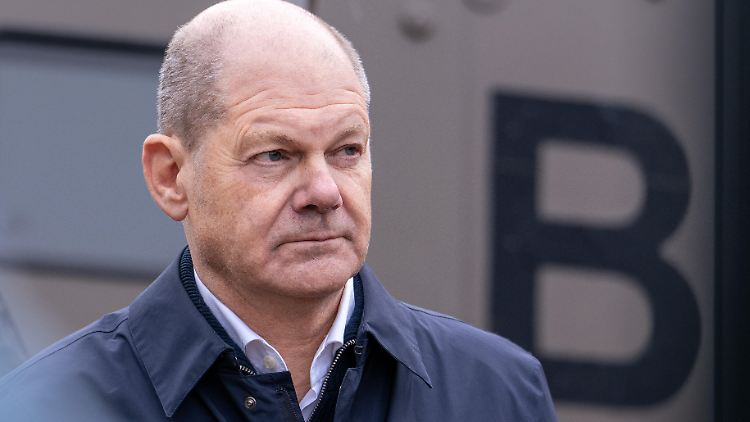Person of the week: Olaf Scholz
The “Germany Pact Government” is more than just a rumor
By Wolfram Weimer
October 24, 2023, 8:44 a.m
The Chancellor and his SPD are becoming increasingly enthusiastic about the “Germany Pact”. You could break with the Greens and FDP and form a coalition with the Union. The CDU and CSU can also gain more and more from the scenario. A preliminary decision could be made in as little as two weeks.
Four weeks ago it was just a daring backbencher rumor in the Bundestag. Capital journalists made dismissive jokes in pub circles. Two weeks ago it reached the strategy meetings at the party headquarters and the first media reported in a gesture of astonishment. For a week now, alongside the new Wagenknecht party, it has been the central theme of Berlin’s power circles: the “Germany Pact Government” as an immediate alternative to the traffic light coalition. Since the CSU leader and Bavarian Prime Minister Markus Söder openly called on the Chancellor to change his coalition and form a “government of national reason”, there has been a heated debate in Berlin. What initially sounded unlikely is increasingly becoming a conceivable option.


With the traffic light break, Scholz would be in control of the process again – and could implement a different migration policy.
(Photo: picture alliance / Flashpic)
The in-depth research in the Bundestag produces the following, surprising picture:
First, the Greens and the FDP are irritated and even annoyed by the whispers between the Social Democrats and Christian Democrats. They officially don’t take the flirtation of the “Germany pactists” seriously and act calm. In the background, however, one can certainly hear the concern that the traffic light coalition could be quickly ended by an annoyed chancellor’s SPD, that the government mandates would suddenly be lost and that from now on they could be seen as scapegoats and unfit to govern. The situation of the traffic light coalition is described by both sides and openly as “miserable” to “poisoned”.
Secondly, after the state elections in Bavaria, the CSU feels free again to shape federal politics in terms of power politics. Both Markus Söder in Munich and Alexander Dobrindt in Berlin make it unmistakably clear that they would immediately enter into a Germany Pact government. Dobrindt explained in the n-tv interview that he believes Germany is at a historical “tipping point” and that the republic will “go off the rails” if Berlin doesn’t take consistent action on the migration crisis. Dobrindt predicts that the AfD could become the strongest party in next year’s European elections if the migration problems are not resolved decisively. He says: “If it serves the country, then we are willing to cooperate.” He thinks: Only the Union, but not the Greens, can really help the SPD with the migration transition. What he doesn’t say: The CSU would suddenly have the chance to regain significant influence in federal politics with a Germany Pact government.
Should the strong Union play junior?
Third, the CDU is more reserved than the CSU, but much more open to a Germany Pact campaign than expected. The CDU also sees the republic at a crossroads, the integration and industrial location crisis as “explosive bombs of internal cohesion”. In the CDU, people are happy about the recent election victories, the highs in the polls and the autumn stature of Friedrich Merz’s strength, where there was still some irritation in the summer. At the same time, however, there is concern about the East German state elections in 2024. There is a risk of a landslide victory for the AfD. From the CDU’s perspective, a Germany Pact government would have the disadvantage that it would be in a junior role to the SPD, even though it is currently twice as strong in surveys and an election victory in 2025 seems within reach.
However, it has the advantage that you can actively fight the migration crisis and the AfD fanal yourself, that you are perceived as supporting the state, capable of governing and constructive and that the new CDU leadership can immediately gain government experience. Friedrich Merz as Vice Chancellor would also be strengthened in his candidacy for Chancellor in 2025. In short: If the Chancellor really called, the CDU would probably move. This is also evidenced by a letter that Friedrich Merz sent to the Chancellor at the weekend, in which he specifically suggested on the migration crisis that “we appoint a small, equal negotiating group made up of representatives of your government and my group to start discussions on this topic.” .
The SPD parliamentary group is opening up
Fourth, in the SPD there is a mixed climate of opinion on the German Pact option. Part of the group believes that a return to the grand coalition is fundamentally wrong and feels that it is better with the chaotic Greens and stubborn Liberals than with the Union. This part hopes for a change in the traffic lights and a gentle solution to the migration issue. However, a growing part of the group is downright shocked by the recent election results, the surveys and the mood among the SPD base. They worry that the SPD is heading for a political disaster with the traffic lights and that “we will only be half as big as the AfD in the European elections.” Many MPs fear losing their seats in the coming election if they “just continue to muddle along”.
Some now see the alliance with the Greens as dangerous for the SPD. A Germany Pact government could allow the SPD to once again appear as a positive shaping force, shake off the Greens and increase the chances for the 2025 elections. A few weeks ago, the Pro-Germany Pact representatives were absolute rarities, but now they are increasing every day. On the other hand, they are far from being in the majority, and the group would not take an initiative to change the coalition on its own. However, if the Chancellor were to take the route of changing the coalition, his own parliamentary group would probably follow him, especially if there would only be bitter, ongoing disputes with the Greens and Liberals.
If the Greens don’t move, the Chancellor will move
Fifth, people in the Chancellery are quite pleased about the German Pact debate. On the one hand, the Chancellor himself initiated it with the Germany Pact initiative and is therefore the sovereign to act. At the same time, the debate that has grown into a coalition question opens up new options for him. He can use this issue to directly discipline the disobedient coalition partners according to the motto: If you don’t follow me completely, I’ll switch sides. According to everything we hear from the SPD, Scholz is not seeking a coalition change to the Union. Rather, he wants to try to persuade the Greens and Liberals to take a greater turnaround in migration. “It also doesn’t fit with the Chancellor’s cautious nature to make a sudden change of sides,” says a high-ranking official in the Chancellery. Scholz also sees the situation as less dramatic than many of his colleagues.
On the other hand, the Chancellor also knows that “something has to happen.” If the traffic light doesn’t move, a German Pact government could possibly save his time in power and his reputation. Internally, the Chancellery is analyzing that there is a “time window until Christmas” for this campaign. The Chancellor’s office is obviously targeting November 6th, when the Chancellor wants to meet with the Prime Minister and put together a large migration package. If he succeeds in getting the traffic lights and the prime ministers to implement a migration transition by November 6th, then he will probably not start a German Pact government, or even hold talks about it. However, if the resistance of the Greens leads to only tiny corrections in migration policy and the government remains weak in action, then the Chancellor would personally start discussions with the CDU.
Conclusion: The coalition change from the traffic light to a Germany Pact government, which was still completely unlikely in September, became a realistic scenario over the course of October. The interests of the SPD, CDU and CSU are surprisingly favorable to the new coalition option. The Chancellor is still hesitating and gives his traffic light until November 6th.
